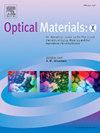The effect of residual mechanical stresses and vacancy defects on the diffusion expansion of the damaged layer during irradiation of BeO ceramics
Q2 Engineering
引用次数: 0
Abstract
The paper presents the results of a study on the application of Raman and UV spectroscopy methods to determine the structural damage kinetics in the near-surface layer of BeO ceramics caused by high-dose irradiation with He2+ ions. Interest in this type of ceramics is due to the combination of its structural and thermophysical parameters, making these ceramics one of the promising classes of materials for microelectronics and structural materials for nuclear reactors, with the possibility of operation in conditions of heightened radiation background. According to the conducted studies, it was established that with the irradiation fluence growth, changes in the nature of deformation structural distortions associated with the accumulation of residual mechanical stresses of tensile and compressive types are observed. At irradiation fluences of 1016–5 × 1016 Не2+/cm2, tensile stresses play a dominant role in structural distortions, while the value of compressive stresses at fluence growth makes up a small share in the overall nature of the deformations. Moreover, an elevation in the irradiation fluence above 5 × 1016 He2+/cm2 leads to a rise in the concentration of defects caused by the formation of oxygen vacancies, as well as He-VO type complexes, the presence of which is indicated by the halo intensity growth in the Raman spectra, as well as a change in the intensity of the absorption bands. Analysis of changes in thermophysical parameters revealed that a rise in structural distortions associated with the accumulation of complex defects results in thermal conductivity reduction and a deterioration in heat transfer processes associated with partial amorphization of the damaged layer. Moreover, the established direct relationship between the value of residual mechanical stresses and the degradation of thermal conductivity indicates the cumulative effect of destructive changes caused by irradiation, as well as the influence of diffusion mechanisms on the damaged layer thickness growth.
氧化铍陶瓷辐照过程中残余机械应力和空位缺陷对受损层扩散扩展的影响
本文介绍了应用拉曼光谱和紫外光谱方法确定 He2+ 离子高剂量辐照导致 BeO 陶瓷近表面层结构损伤动力学的研究结果。人们之所以对这类陶瓷感兴趣,是因为其结构参数和热物理参数相结合,使这类陶瓷成为微电子材料和核反应堆结构材料中很有前途的一类材料,并有可能在高辐射本底条件下工作。根据所进行的研究,可以确定随着辐照通量的增加,与拉伸和压缩类型的残余机械应力积累相关的变形结构扭曲的性质也会发生变化。当辐照通量为 1016-5 × 1016 Не2+/cm2 时,拉应力在结构变形中起主导作用,而在通量增长时,压应力值在变形的总体性质中只占很小的比例。此外,辐照通量提高到 5 × 1016 He2+/cm2 以上时,氧空位以及 He-VO 型复合物的形成会导致缺陷浓度上升,拉曼光谱中晕强度的增长以及吸收带强度的变化都表明了这些缺陷的存在。对热物理参数变化的分析表明,与复合缺陷积累相关的结构畸变增加导致热导率降低,与受损层部分非晶化相关的传热过程恶化。此外,残余机械应力值与热导率下降之间的直接关系表明,辐照造成的破坏性变化具有累积效应,而且扩散机制对受损层厚度增长也有影响。
本文章由计算机程序翻译,如有差异,请以英文原文为准。
求助全文
约1分钟内获得全文
求助全文
来源期刊

Optical Materials: X
Engineering-Electrical and Electronic Engineering
CiteScore
3.30
自引率
0.00%
发文量
73
审稿时长
91 days
 求助内容:
求助内容: 应助结果提醒方式:
应助结果提醒方式:


